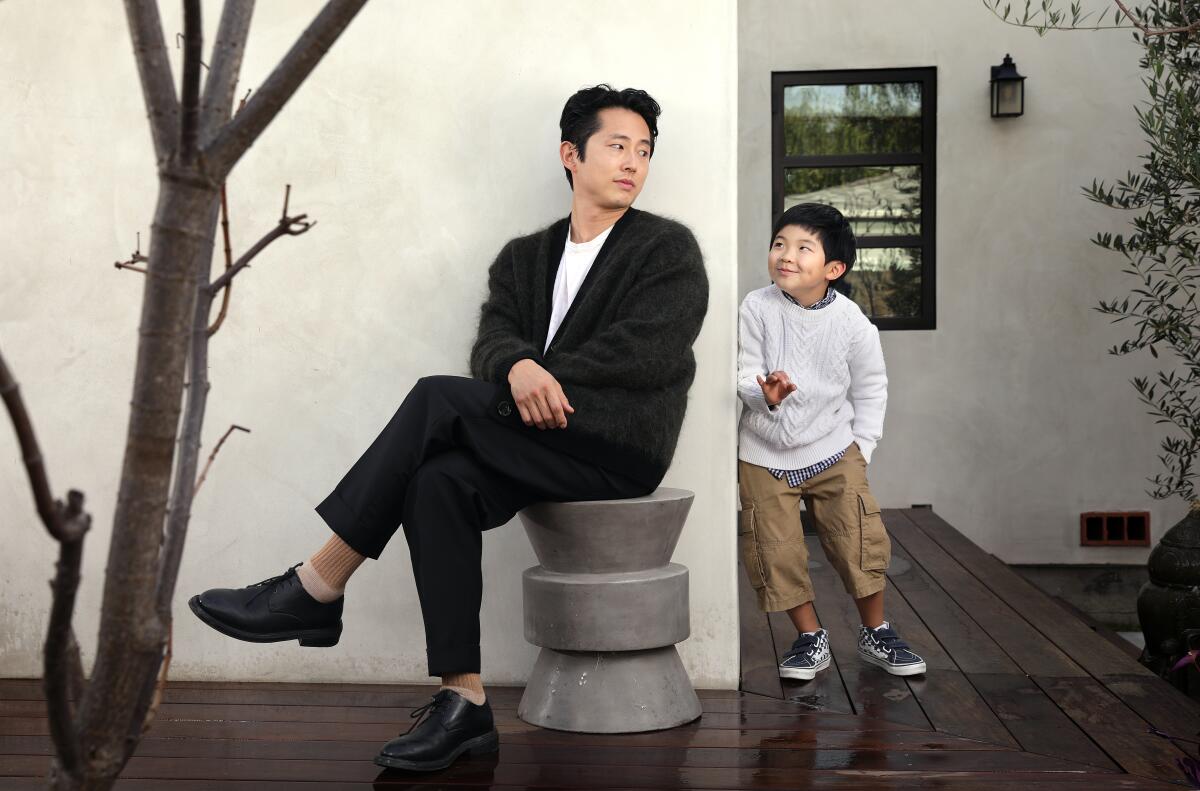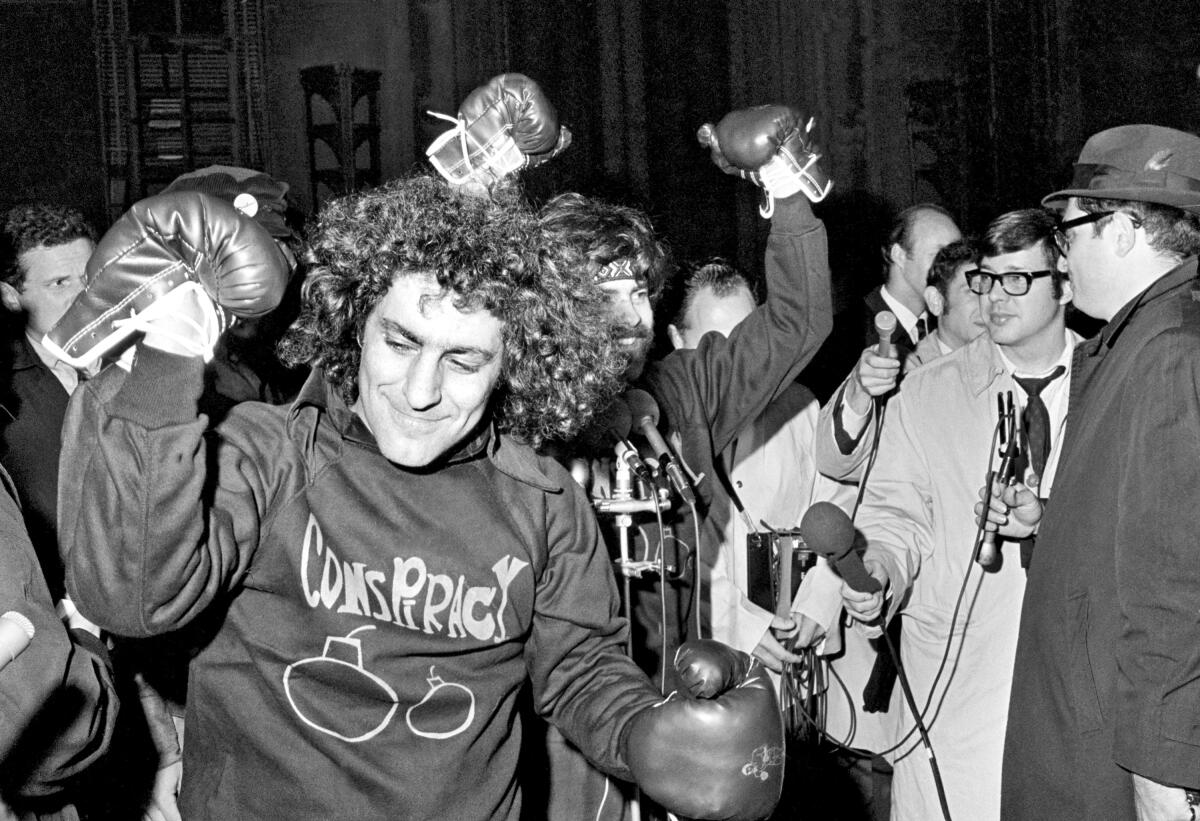‘Minari’ director: Will wine help a family screening go down?

- Share via
Is there life on Mars? Guess we’ll know within a Martian year, which apparently lasts 687 days, or roughly the same amount of time as this awards season. Meanwhile, I know I’ll be calling The Times’ “worst-case-scenario thinker,” whenever things get bad here on Earth and not this guy, as he clearly doesn’t know how to pack for an “overnight trip.”
Sign up for The Envelope
Get exclusive awards season news, in-depth interviews and columnist Glenn Whipp’s must-read analysis straight to your inbox.
You may occasionally receive promotional content from the Los Angeles Times.
Also: The Oscars are just a little more than two months away.
I’m Glenn Whipp, awards columnist for the Los Angeles Times and host of The Envelope’s Friday newsletter. Rain or shine, I’ll be here for you all the way through the end of April. No trips to Cancún in the meantime. Promise.
The unspoken feelings of ‘Minari’
I gave a shout-out to “Minari’s” accomplished and adorable young star Alan Kim last week. When I spoke with him, it was part of a larger story on this beautiful movie, which premiered at Sundance last year. “Minari” lead Steven Yeun told me about that emotional evening, one that he shared with his father, mirroring an experience that writer-director Lee Isaac Chung had with his own family.
“I showed it to them the day after Thanksgiving, which meant that the day before, during Thanksgiving dinner, I was a nervous wreck,” Chung says of unveiling his loosely autobiographical film. “When it came time to finally show them, I was thinking, ‘Do I serve wine at this thing? Will wine make them more upset, or will it help ease the mood?’ I was more nervous about this than Sundance, to be completely honest.”
For the record, Chung did serve wine, and at some point he stopped worrying about whether he had honored his parents or portrayed their struggle accurately and just enjoyed the fact that they were together in his South Pasadena home, everyone appreciating that they had endured and were still together.
‘Mank’ set to bank plenty of Oscar noms
After landing a leading six Golden Globe nominations a couple of weeks ago, David Fincher’s “Mank” was once again the awards season’s King Kong, standing atop the Empire State Building, swatting aside all competitors ... until the next day, when SAG Awards voters snubbed it in the ensemble category and also elbowed out expected Oscar supporting actress nominee Amanda Seyfried. Then it was RIP “Mank.” Enjoy your consolation prize: a three-day, all-expenses paid trip to Hearst Castle.
But if you comb through my Oscar predictions for the categories often grouped under the umbrella of “crafts,” you’ll see one movie featured in each and every one.
“Mank” lives! “Mank” lives!
Enjoying this newsletter? Consider subscribing to the Los Angeles Times
Your support helps us deliver the news that matters most. Become a subscriber.
‘Chicago 7’ began with a fib to Steven Spielberg
Aaron Sorkin, writer-director of the Oscar contender “The Trial of the Chicago 7,” wrote about why it took 14 years to bring the movie to audiences. For starters, when Steven Spielberg initially approached Sorkin all those years ago to gauge his interest in writing the screenplay, Sorkin didn’t know anything about the legal case involving Abbie Hoffman, Tom Hayden, Jerry Rubin and others.

“I said, ‘Yes! The Chicago 7! I’d love to write a movie about the Chicago 7!’ Sorkin writes in an essay recently published in The Times. “As soon as I left his house, I called my father and asked him who the Chicago 7 were. I was just saying yes to working with Spielberg the way literally any member of the Writers Guild would. But over the next 14 years, my relationship to the story would change into something else.”
The movie, Sorkin writes, “began to organize itself into three stories that I would tell at once: The courtroom drama; the evolution of the riot (how did what was supposed to be a peaceful protest turn into such a violent clash with the police and National Guard); and Tom and Abbie — two guys on the same side who couldn’t stand each other, with each thinking the other was doing harm to the cause.
“I’d gone from ‘a chance to work with Spielberg’ to ‘a good story to tell.’”
Feedback?
I’d love to hear from you. Email me at glenn.whipp@latimes.com.
Can’t get enough about awards season? Follow me at @glennwhipp on Twitter.
Sign up for The Envelope
Get exclusive awards season news, in-depth interviews and columnist Glenn Whipp’s must-read analysis straight to your inbox.
You may occasionally receive promotional content from the Los Angeles Times.




